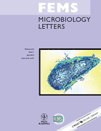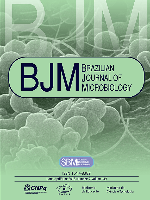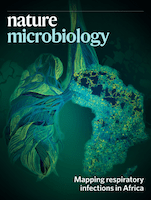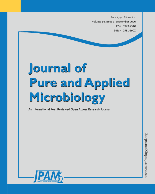
FEMS MICROBIOLOGY LETTERS
Scope & Guideline
Advancing the Frontiers of Microbial Knowledge
Introduction
Aims and Scopes
- Microbial Diversity and Ecology:
The journal publishes studies that explore the diversity of microbial communities across various environments, including aquatic, terrestrial, and extreme habitats. This includes investigations into the ecological roles of microorganisms and their interactions within ecosystems. - Pathogenic Microbiology:
Research focusing on pathogenic microorganisms, their mechanisms of infection, virulence factors, and antibiotic resistance patterns is a core area. This encompasses studies on foodborne pathogens, clinical isolates, and their implications for public health. - Biotechnological Applications:
The journal encourages research that leverages microbial processes for biotechnological innovations, such as bioremediation, fermentation technology, and the development of novel antimicrobial agents. - Genomic and Molecular Microbiology:
Papers that delve into the genomic analysis of microorganisms, including studies on gene expression, metabolic pathways, and the genetic basis of traits related to survival and pathogenicity, are prominently featured. - Microbial Interaction and Symbiosis:
The journal highlights research on the interactions between microorganisms and their hosts, including studies on symbiosis, commensalism, and the impact of the microbiome on health and disease.
Trending and Emerging
- Microbiome Research:
The study of microbiomes, particularly in relation to human health, agriculture, and environmental systems, is gaining momentum. This includes investigations into how microbial communities influence health outcomes, plant growth, and ecosystem functioning. - Synthetic Biology and Genetic Engineering:
There is an increasing trend towards research that employs synthetic biology techniques to engineer microbial strains for specific purposes, such as enhanced production of metabolites, biocontrol agents, or bioremediation capabilities. - Impact of Environmental Changes on Microbial Communities:
Research addressing how climate change, pollution, and habitat alteration affect microbial populations and their functions is on the rise. This includes studies on microbial resilience and adaptation mechanisms in response to changing environmental conditions. - Antimicrobial Alternatives and Natural Products:
With the global rise of antibiotic resistance, there is a notable increase in research focused on alternative antimicrobial strategies, including the exploration of natural products, bacteriophages, and novel antimicrobial compounds. - Microbial Interactions in Health and Disease:
Emerging studies are increasingly investigating the complex interactions between human microbiota and pathogens, particularly in the context of chronic diseases, metabolic disorders, and immune responses.
Declining or Waning
- Traditional Microbial Taxonomy:
Research focusing solely on the classification and identification of microbial species without incorporating functional or ecological perspectives is becoming less common. The trend is shifting towards integrative approaches that combine taxonomy with functional genomics and ecology. - Cultivation-Based Studies:
There is a noticeable decline in papers solely dedicated to cultivation-based methods for studying microbes. As metagenomic and high-throughput sequencing techniques become more accessible, researchers are increasingly opting for culture-independent methods. - Antimicrobial Resistance Mechanisms:
Although still relevant, the frequency of studies focused exclusively on basic mechanisms of antimicrobial resistance is waning. More emphasis is being placed on translational research that connects basic science with clinical and environmental implications.
Similar Journals

BRAZILIAN JOURNAL OF MICROBIOLOGY
Bridging Health and Environment Through MicrobiologyThe BRAZILIAN JOURNAL OF MICROBIOLOGY, published by SPRINGER, stands as a pivotal platform in the field of microbiology, offering an open access model since 2000. With the ISSN 1517-8382 and E-ISSN 1678-4405, this esteemed journal encourages the dissemination of groundbreaking research and innovative methodologies that contribute to the understanding of microbial life, its role in health and disease, and its environmental impact. Based in Switzerland and accessible globally, the journal’s categorization in the Q3 quartile for Microbiology reflects its commitment to quality and relevance in the scientific community. As of 2023, it ranks 121 out of 182 in the Scopus listings for Microbiology, further highlighting its growing influence in immunology and microbiological research. With converged years spanning from 1992 to 2024, the journal continues to support a diverse range of studies, making it an invaluable resource for researchers, professionals, and students alike.

Nature Microbiology
Empowering Researchers to Shape the Future of MicrobiologyNature Microbiology is a premier journal published by NATURE PORTFOLIO that has firmly established itself within the realms of microbiological research since its inception in 2016. Based in the United Kingdom, this prestigious journal specializes in the intricacies of applied microbiology, cell biology, genetics, immunology, and medical microbiology, making it a cornerstone for academics and professionals alike. With an impressive Scopus ranking placing it in the top tier across various relevant categories—such as rank #3 in Genetics and #2 in Applied Microbiology—it underscores the journal’s commitment to high-quality, impactful research. Although it operates under a subscription model, Nature Microbiology's broad Open Access policy facilitates greater dissemination and visibility for its authors. The journal's objectives are centered around publishing cutting-edge advancements that enhance our understanding of microbial life, its interactions, and applications in health and disease. As a Q1 journal across multiple disciplines, it holds immense significance for researchers, professionals, and students enthusiastic about the latest innovations and breakthroughs in microbiology.

JOURNAL OF BASIC MICROBIOLOGY
Pioneering Research for a Healthier TomorrowJOURNAL OF BASIC MICROBIOLOGY is a premier publication in the field of microbiology, published by WILEY since 1985. With a significant presence in Germany, this journal encompasses a wide spectrum of research topics, focusing on applied microbiology and biotechnology as well as diverse areas within medicine. Holding a commendable Q2 ranking in both its categories for 2023, it plays a crucial role in disseminating innovative findings and methodologies to the community. Researchers will find it to be an essential platform for sharing high-quality work, where it currently stands at rank #47 in the applied microbiology and biotechnology category, representing the 63rd percentile among international journals. The JOURNAL OF BASIC MICROBIOLOGY caters to a growing audience of professionals and students, offering insights essential for advancement in microbiological research and its applications. While it does not currently offer an Open Access option, it remains an influential outlet for academic excellence, continuously contributing to the development of the field through its rigorous peer-reviewed articles.

Malaysian Journal of Microbiology
Transforming Microbial Research into Real-World ApplicationsMalaysian Journal of Microbiology is a prestigious open-access journal dedicated to advancing the field of microbiology, published by the Malaysian Society for Microbiology. Since its inception in 2005, this journal has become an essential platform for researchers and practitioners, facilitating the dissemination of innovative studies in applied microbiology, biotechnology, and infectious diseases. Based in Penang, Malaysia, this journal not only focuses on local microbiological research but also positions itself within the broader global scientific community. Although currently placed in the Q4 category in several relevant fields—including Applied Microbiology and Biotechnology, Infectious Diseases, and Medical Microbiology according to the 2023 Scopus rankings—it plays a crucial role in encouraging novel research and fostering collaboration among scientists. The journal encourages submissions that contribute to the understanding of microbial processes, disease mechanisms, and novel biotechnological applications, thereby supporting the continuous growth of knowledge in microbiology. With open access since its launch, the Malaysian Journal of Microbiology ensures that all published works are freely available to the public, enhancing their visibility and impact within the scientific community.

Microorganisms
Advancing the frontiers of microbiological research.Microorganisms is a leading open-access journal published by MDPI based in Switzerland, catering specifically to the rapidly evolving fields of microbiology and virology. Since its inception in 2013, the journal aims to foster the dissemination of high-quality research through its comprehensive and interdisciplinary platform, with a particular focus on both fundamental and applied microbiological sciences. Contributing to its esteemed reputation, Microorganisms holds a commendable Q2 ranking in the categories of Microbiology and Virology, as well as in Medical Microbiology, highlighting its significance in the academic community. With a consistent impact, evidenced by its rankings in Scopus—such as rank #25 in Virology and #56 in Microbiology—the journal serves as an invaluable resource for researchers, professionals, and students looking to stay at the forefront of microbiological research. As an open-access journal, Microorganisms ensures that vital research findings are readily available to a global audience, promoting collaboration and innovation in the study of microbial life and its implications for health and disease.

ANNALS OF MICROBIOLOGY
Empowering scholars with vital insights in microbiology.ANNALS OF MICROBIOLOGY is a prestigious journal dedicated to advancing the field of microbiological research, published by BMC, renowned for its commitment to providing open access to vital scientific findings. With its ISSN 1590-4261 and E-ISSN 1869-2044, this journal provides a platform for the dissemination of high-quality research since its inception in 1997. Renowned for its rigorous peer-review process, it has attained a commendable Q2 ranking in the Applied Microbiology and Biotechnology category in 2023, reflecting its significant contributions to the discipline. Positioned within the 67th percentile among its peers in Scopus rankings, ANNALS OF MICROBIOLOGY continues to facilitate the exchange of innovative ideas and methodologies, serving as an essential resource for researchers, professionals, and students alike. The journal covers a broad spectrum of topics, emphasizing the intersection of microbiology with applied sciences, thereby fostering an environment that encourages collaboration and advancement in this vital field. Scholars seeking to stay at the forefront of microbiological studies will find ANNALS OF MICROBIOLOGY an invaluable addition to their academic pursuits.

PLASMID
Exploring the intricate world of plasmids.PLASMID is a prestigious academic journal published by Academic Press Inc Elsevier Science that focuses on the dynamic field of molecular biology, particularly in the study of plasmids and their roles in gene function and expression. Since its inception in 1977, the journal has built a robust reputation, currently holding a Q3 category ranking in Molecular Biology and positioning itself within the 34th percentile based on Scopus metrics, making it a valuable resource for researchers and professionals alike. With an ISSN of 0147-619X and E-ISSN 1095-9890, PLASMID offers a wealth of articles that delve into cutting-edge research, facilitating knowledge-sharing and inspiring innovations in the field. Although it does not operate under an open-access model, the journal remains committed to advancing scholarly communication and maintaining high standards of academic rigor. Researchers and students engaged in biochemistry, genetics, and molecular biology will find PLASMID to be an essential platform for disseminating their findings and exploring novel ideas.

Frontiers in Microbiology
Leading the Charge in Microbial DiscoveriesFrontiers in Microbiology is a leading open-access journal published by Frontiers Media SA, available since 2010, and based in Switzerland. As a prominent platform for innovative research, it specializes in microbiology and medical microbiology, marked by its impressive Q1 classification in the respective fields, reflecting its significant impact and relevance in advancing microbial sciences. With a Scopus ranking of 49th in Microbiology and 41st in Medical Microbiology, this journal is positioned among the top-tier publications, catering to a diverse audience of researchers, professionals, and students. The journal aims to disseminate groundbreaking findings and foster discussions that drive the field forward, ensuring a comprehensive coverage of microbiological studies, from basic research to applications in healthcare and beyond. Enjoy unrestricted access to cutting-edge articles that contribute to both theoretical and applied aspects of microbiology, enriching the scientific community's knowledge base.

mSphere
Unleashing the power of molecular exploration.mSphere is a leading open-access journal published by the American Society for Microbiology, dedicated to the dynamic fields of Microbiology and Molecular Biology. Since its inception in 2016, mSphere has rapidly established itself as a reputable source of scholarly research, achieving notable impact factors and excellence within the academic community. The journal ranks in the top quartile (Q1) amongst its peers in Microbiology, and Q2 in the field of Molecular Biology, demonstrating its significance and relevance through Scopus rankings—specifically, it holds the #42 spot out of 182 in the Microbiology category and #108 out of 410 in Molecular Biology. With an editorial commitment to advancing the understanding of microbial and molecular sciences, mSphere provides an accessible platform for researchers, professionals, and students alike to disseminate groundbreaking findings. The journal promotes rigorous peer-review and invites innovative contributions aimed at enhancing microbial research mobility and molecular exploration. Accessible openly since 2016, mSphere continues to thrive as an influential publication driving scientific dialogue and discovery in the microbiological sciences.

Journal of Pure and Applied Microbiology
Advancing Microbial Knowledge for a Sustainable FutureJournal of Pure and Applied Microbiology, published by DR M N KHAN, is an esteemed Open Access journal that has been dedicated to advancing the frontiers of microbiological research since its inception in 2007. Located in Bhopal, Madhya Pradesh, India, this journal presents a platform for researchers and professionals in the fields of Applied Microbiology and Biotechnology, offering insights that span a diverse range of topics critical to both scientific progress and industrial applications. As of 2023, the journal is categorized in the Q3 and Q4 quartiles, demonstrating its relevance and growing impact within the community—ranking #219 in Biochemistry, Genetics and Molecular Biology and #93 in Immunology and Microbiology. With an emphasis on accessibility, the journal has embraced an Open Access format since 2017, allowing for a wider dissemination of knowledge. By publishing high-quality research, the Journal of Pure and Applied Microbiology plays a pivotal role in fostering innovation and collaboration among researchers, students, and industry professionals alike.